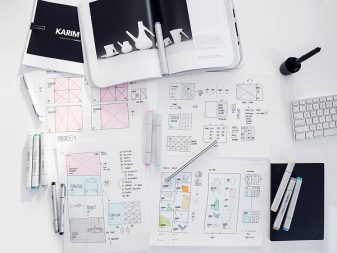There is a huge demand for UX design today, and yet not even all representatives of this field of activity (or related fields) can say with accuracy what it is. The ancestors of this direction are specialists in industrial design, as well as masters of user orientation design and man-machine interaction. At first glance, everything is not entirely clear, and anyone who decided to come into this sphere may get confused in terms. This area is very interesting, promising and, most importantly, in demand.

Who are they?
UX (User Experience Designer) is a specialist in design and engineering. With the second paragraph, this work is even more connected. The task of this specialist is to ensure that the product he is working on is as user-friendly as possible. It is about both sites and applications. In the functions of a UX-designer (or UI-designer, they say so too) - creating an attractive product that the user wants to either download, buy, or place an order on the site.
It is possible to say that this profession is new, but with a little clarification. As long as there is trade and the market, there are so many people who are responsible for giving the product an attractive appearance. Only UX designers use computer tools. If a person wants to master this profession, he will have to analyze whether he has those skills and the background that will become the basis for the change of activity. Indeed, newcomers rarely come to this area. Graphic designers and marketing specialists with the desire to master a new specialty are becoming good UX designers.
Sometimes a UX designer also performs the functions of a UI designer (User Interface).Therefore, both names on the market today are actively used, replace each other. But to be precise, UX is the structure of the product, the comfort of its use, and UI is the appearance, successful color combinations.
Although, of course, both can be performed by one person, and not very large companies often look for a part-time job.

Pros and cons of the profession
The main plus is the demand on the labor market. And the demand for such masters is only growing.
Indisputable advantages of the profession:
- high level of remuneration;
- professional growth (there is little stagnation in this field of activity, you need to constantly improve, adapt to changing standards);
- the possibility of remote work (the main advantage for those who would like to winter in warm countries);
- the possibility of retraining in related areas ("horizontal" career growth);
- high probability of development of over-professional skills.
But it can’t do without minuses, as, indeed, in any other profession. What some applicants fear:
- high competition;
- the employer may ask the applicant for a detailed portfolio;
- need to constantly conduct research among users;
- high level of responsibility for the final result.
Although all the cons can be called conditional, especially for a person who is confident in their abilities.
But really a significant drawback of the profession can be considered the need for a long stay at the monitor. But hypodynamia can also be fought, compensating for its physical activity in non-dedicated time.

What are you doing?
And now for the specifics - the scope of the UX designer is great, and each company inviting this specialist to itself should clearly outline it. The contract usually prescribes job responsibilities, which must be carefully read before signing the document.
What is usually included in these duties:
- analysis of user scenarios;
- development of a clickable product prototype;
- formation of a portrait of Central Asia (target audience);
- work on the logic of using the product;
- prototype testing, correction based on testing results;
- repeating the development-testing cycles until the end result is reached — optimal interaction with the product for the user.
Research is a significant part of the work of this specialist. And every person who decides to embark on this professional path, both morally and intellectually, must be prepared for this. Of course, you need to have your own ideas about the prototype and the final product, but even developed intuition without real research does not matter.
In part, the UX designer is both a marketer and a business analyst, but it is impossible to be in the profession without a directly designed “eye”. As without developed skills, practical experience.

Requirements
To say that skills are everything, and personal qualities just help to succeed faster, of course, you can. But that would be an exaggeration. To achieve goals, a balance of both is needed. No matter how smart and talented a person is, if he simply cannot organize his working regime, working remotely, he will fail.
Personal qualities
Strong analysts remain in this profession. This can be developed, but the natural tendency to qualitative analysis is difficult to surpass. There are people who can think in such a way that not a single nuance will slip out of their control. They make wonderful analysts, tactics, and practical researchers. For those who find the full analysis of the project boring and routine, it will be difficult to become a good UX designer. What other personal qualities are useful in the profession?
- Clear self-organization. Time management is the power of the profession. If you correctly allocate time resources, understand your strengths and, for example, know when it is better to analyze and when to structure, everything will work out.A person with such skills does not have procrastination (which every second office worker complains about today), there are no “burning” projects and failed deadlines.
- Meticulousness. Sometimes you have to mess with little things all day. The specialist should not be tempted to do it “as is” and proceed to the next step.
- Need for self-development. The market is growing and developing, technologies are improving, the requirements of the employer are also changing. And these are the realities that the UX designer cannot close his eyes to.
- Self-confidence. At first glance, it’s not the most important personal quality for a specialist who often works “remotely”. But smart and talented designers often remain overboard in the profession, because they could not cope with self-presentation, failed to prove themselves at the interview, were afraid to take on a complex project.
- Psychological flexibility. And emotional - including. If a person becomes depressed due to one unsuccessful project, is faced with despair due to the trivial comment of one dissatisfied user, he will not stand the professional race. You need to remain calm, to be able to predict and learn from your mistakes.
- Initiative. Of course, you can be “quiet” in this profession. But, as you know, optimists and activists are turning the globe. Even if the TK of the leader is clear and strict, and deviating from him is not desirable, and the UX designer sees a different solution, he should not be afraid to voice it. The desire to do better, and not “come down” is the key quality of a successful UX designer.
The list can be continued, most importantly, even before starting in the profession, it is understood that even a diploma and high intellect do not guarantee a dizzying career. While clever women rest on their laurels, diligent and hardworking overtake them in a career race.

Skills
Technical moments, oddly enough, the easiest thing in the profession. It is not so difficult to study and master them. But to successfully apply, promote, convince, guess - this is without which technical methods remain ineffective. We list the main professional skills of a UX designer.
- Professional communication. “You can be closed and self-sufficient in life, but at work, be prepared for productive negotiations.” With such a phrase, a leader can start a conversation. The UX designer has to deal with a large number of people: from other designers to users, product managers and executives. To negotiate, to co-organize - all this must be able to ensure that the end result is successful and profitable. To be able to listen, to be able to speak is really very important for this specialist.
- Research experience. If you do not know users, creating a product for them is simply impossible. Communicating with them is the most powerful lever in the hands of a UX designer. He should receive an assessment of the product, ideas, functions and then wisely use the information received.
- Information architecture. This is the main set of specialist tools that will allow him to turn any chaos into an ordered system. This is the menu hierarchy, and the priority of items, and the choice of clickable words.
- Teamwork. The more necessary designer the designer will include in the design process, the more thoughtful and optimized he will turn out. There is no need to be afraid of collaborations and you don’t always need to “pull the blanket over yourself”.
- Build interaction scripts and layouts. A layout is an interface framework, and an interaction scenario is a sequence of layouts. To work out the layouts, you do not need to sit down at the computer, they are best worked out on paper (although this is not easy, but also time-consuming).
- Copywriting. Being able to write capacious texts for an interface is a great advantage of a UX designer. If you have philological inclinations, you can train this skill.
Many other things come with experience, but with basic skills you need to be already at the start of your professional path.


Training
In domestic universities, there is no such specialty yet. But the requirements of companies often vary, a strict list of job responsibilities is also impossible to find. Because UX designers are usually graphic or industrial designers. And in these specialties you can learn in a large number of higher educational institutions.
In addition, many private IT schools offer training courses in this specialty, and on the basis of already having a higher education (possibly in related specialization), one can get excellent training.











